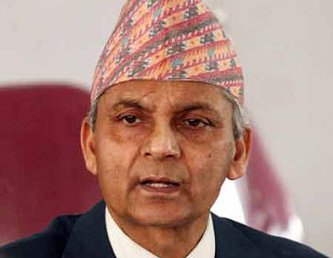
After holding 12 rounds of meetings in a week, political parties, which failed to settle their own disagreements, gave the responsibility to the Interim Election Council to decide the election laws and the date
Finally, the High Level Political Committee reached a consensus to hand over the responsibilities, including announcement of election date and sending Constituent Assembly Election Ordinances to the President, to the Interim Election Council of Ministers, paving the way to hold the elections in November.
Be it just a coincidence or work worth the real effect, leaders of four parties agreed to hand over the responsibility to declare the election date to the government exactly when Nepali Congress leader Sher Bahadur Deuba reached India on a five-day tour. Indian prime minister Dr. Man Mohan Singh and Indian leaders suggested to Deuba to work in holding the elections.
"India wants to see the election of the Constituent Assembly in Nepal as soon as possible," said Indian prime minister Man Mohan Singh. “India will provide the much needed support to Nepal to hold the election."
Political party leaders held meetings with chairman of the Council of Ministers Khil Raj Regmi, president Dr. Ram Baran Yadav and among themselves several times before their latest accord. They had failed to reach a consensus on certain provisions of law. The parties took this surprising decision not only on the basis of their conscience. As Nepal’s uncertainty looms large over the date of elections, Kathmandu based European Ambassadors and US ambassador to Nepal were pressing the parties to take the decision.
Under pressure, chairman Regmi, on June 8, had made it clear that the government would unilaterally announce the election date and send the ordinance to the president. In an all-party meeting, president Dr. Ram Baran Yadav also pressed party leaders to take a decision.
Respecting the court's order, the government will announce the election date and the Election Commission will announce Constituency Delineation Commission simultaneously. However, announcing the date alone cannot guarantee the elections in November.
Although four parties may agree on the ordinance issued by the government by accommodating the threshold under proportional electoral system, CA downsizing and eligibility of candidates in the new Constituent Assembly elections, nothing will move as desired unless and until CPN-Maoist and Madhesh groups agree to board on elections.
Internal Political Dynamics
Although Nepali Congress leaders including its chief Sushil Koirala and deputy Ram Chandra Paudel, are yet to open their mouth, the visit of Sher Bahadur Deuba to India has already created an unpleasant situation within NC as supporters of Koirala and Paudel have started to criticize Deuba’s visit.
Whether one likes it or not, Sher Bahadur Deuba is the only leader in Nepali Congress now with a bigger mass appeal than Poudel and Koirala. A large number of party workers look up to Deuba to save Nepali Congress from the brink of collapse.
The situation with other parties is also not different. UCPN-Maoist and CPN-UML are yet to expand their central committee. The recent news of unity talks of UCPN-Maoist and CPN-Maoist, which both parties termed nonsense, has created a panicky situation among their people.
Although two parties of former Panchas unified under the leadership of former prime minister Surya Bahadur Thapa, they are yet to show their formidable presence. The efforts of Madhesh based parties to form a single alliance are yet to materialize. Even the difference in Samyukta Madheshi Loktantrik Morcha is growing. Former minister and leader of Sadbhvana Party Rajendra Mahato has threatened to withdraw from SLMM.
Former King Gyanendra’s religious trip to the heartland of Terai is also significant. The former monarch is trying to woo Madheshis of five districts of Madhesh. Former Minister Jay Prakash Gupta, who was recently released from prison after completing his one year tenure on corruption charges, started negotiations with armed groups waging war in Terai.
Elections Commission
Chief Election Commissioner Nil Kanth Uprety has already made it clear that EC is ready to hold the elections. Once the CA Election Ordinance is issued, the Election Commission will proceed to hold the elections. As the process of voter registration and distribution of voter identity cards is going smoothly, the commission is likely to publish the voters’ list too. One of the difficult tasks ahead is to delineate constituencies on the basis of demography. Management of International election observers is another challenge for the Commission.
Coming Scenario
Elections or no elections, the coming scenario is very unpredictable.
a) As the future of present government will be in limbo after November, the announcement of election will give a new life to the government. Since the government receives political backing from four parties, it has to face less challenge from other parties including CPN-Maoists, Madhesh based and ethnic parties.
b) The decision also preempted the efforts of former CA members under the leadership of former chairman of Constituent Assembly to demand revival of dissolved Constituent Assembly.
c) The decision also preempted president Dr. Ram Baran Yadav from dissolving four party high level political mechanism and the government led by Khil Raj Regmi to form the government under him or vice president. However, the political risk is yet to go away. Nepal will still have to go a long way to have a stable government.

Keshab Poudel
Poudel is the editor of New Spotlight Magazine.
- KUL MAN GHISING: Bowing Down To The People
- Apr 13, 2025
- POLITICAL VIOLENCE: Culture of Impunity
- Apr 11, 2025
- PM OLI MEETS PM MODI: No Progress
- Apr 09, 2025
- PM OLI’S THAILAND VISIT: Flip Flop
- Apr 08, 2025
- FM Dr. Deuba’s India Visit: Mission Aborted
- Mar 26, 2025















